The harvest is far from over for Alex, and conditions are very challenging with very wet ground. Alex says it is the worst he has ever seen for this time of year.
The spring barley is finished, but Alex describes the crop this year as a waste of time. The best of the barley yielded 2.7t/ac, but the worst came in at 2t/ac.
The spring organic oats are also finished, and while they weren’t great, they will leave more of a margin than spring barley this year. The organic oats on fresh ground did 2t/ac, while other fields did between 1t/ac and 1.5t/ac. This was mostly down to weeds such as redshank.
Alex says it was a perfect storm for the weeds this year, with thin crops due to the dry weather in May, allowing weeds to take over once the rain did arrive.
Spring beans on hire for customers and spring oilseed rape are still to be harvested. The rape was swarthed last week but is quite slow to ripen, and it will be at least 10 days before it is harvested.
The crop does look promising as grain fill was quite good due to the sunny, warm weather at the start of the month.
That good weather also gave Alex the opportunity to plant some winter oilseed rape, but he did not get to sow as much as planned.
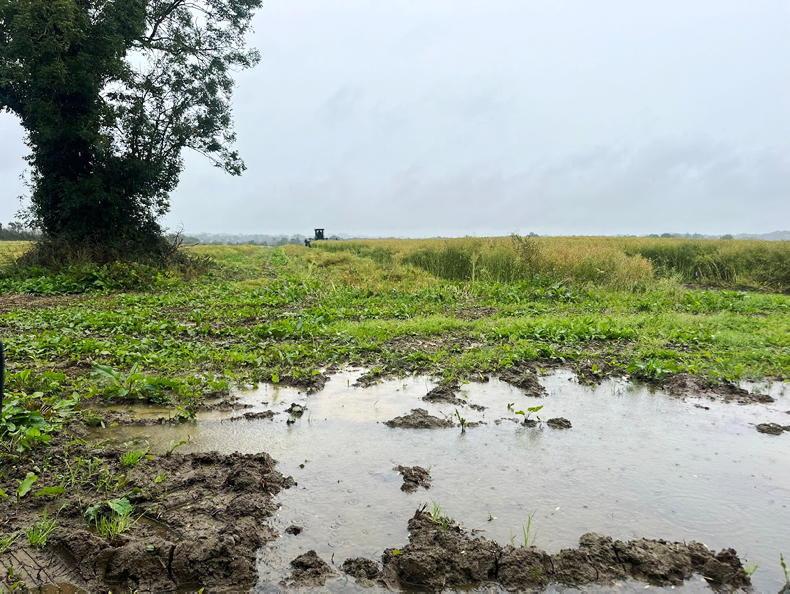
A common sight on many farms as spring oilseed rape is swarthed in the background on Alex's farm.
The variety is PT303, which did well on the farm this year.
Winter cereals will soon be planted, and while Alex would usually start planting on wet land and leave dry fields until last, it will be the opposite way around this year due to the wet conditions at present.
Alex says it is hard to stay motivated and get going again with planting, with high input prices making it unlikely that next year will be more profitable than this year.
Lots of slurry and dung are being applied by Alex at the moment to try to keep these costs down.
The harvest has been wrapped up for a few weeks at this stage for Patrick.
The last couple of fields of spring barley were fairly broken down by the time they were cut, and while there were some ears on the ground, Patrick says he managed to get most of the crop.
As there are plenty of crops still to be cut around the country, and after hearing of plenty of poor crops, Patrick is relatively happy with his spring barley, even if his yields are well back on average.
However, not as much barley as hoped for passed for roasting. There was also very little straw on the crop, yielding around 4.5 to 5 4x4 bales/ac. Geraldine did a bit better than Planet on straw yield and breakdown. Because of the low yields and poor weather, the straw chopping worked out very well this year, and Patrick thinks he will do more of this in the coming years.
The only issue with the chopped straw was that it made the establishment of cover crops more difficult, especially with the late harvest and subsequent planting date.
This was not helped by the fact that most of the cover crops were not rolled as the ground was not dry enough.
The spring beans did quite well, at 2.4t/ac at low moistures. This land is now destined for gluten-free winter oats.
Patrick has also been busy preparing for the planting of winter cereals.
Hedges have been cut, slurry was spread on stubbles destined for winter barley, and some stubbles were sprayed off. This will be completed this week, and some chicken manure will be spread.
Patrick will try to hold back as long as possible to reduce the BYDV risk but he recognises that the work will have to be done whenever the ground is fit this year.
The grain harvest was finished in the last days of August on the O’Gorman farm, and the beginning of the potato harvest is now fast approaching.
While the weather was good for the first half of September, the farm has recorded 72mm since the middle of the month. This brings the total for the year to 710mm to date, only 180mm short of the yearly average.
Kevin is hoping for a dry period soon as there is a lot of work to be done between lifting potatoes and planting cereals. While waiting for kind weather, preparations are being made for what will be a busy time on the farm once conditions allow.
The winter oilseed rape was planted at the end of August. Establishment was very good and it is growing nicely.
The drilling of winter cereals will begin as soon as conditions allow. All cereals will be established by a plough, till, sow method.
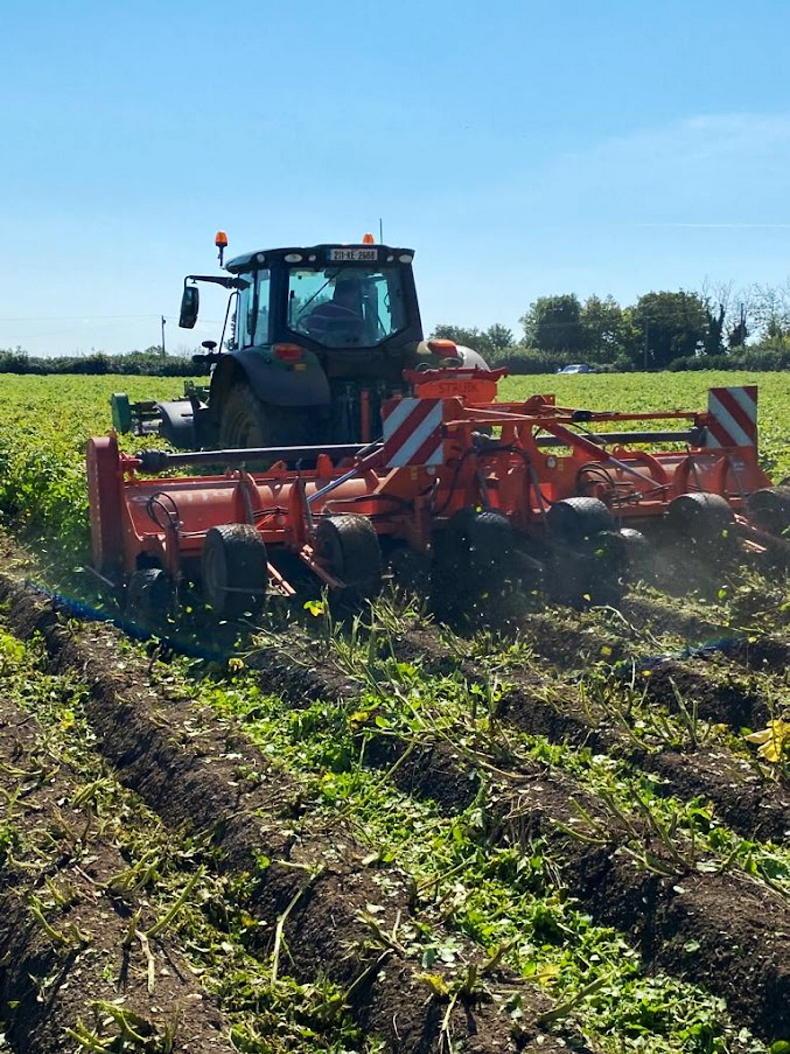
The fine weather at the start of the month was ideal for flailing potatoes on the O'Gorman farm.
In terms of varieties, KWS Tardis winter barley will be planted, while the winter wheat will be split between Graham and a new variety on the farm, Champion.
Flailing of potato haulm began on 4 September. The objective of the flail mower is to destroy as much of the green leaf of the potatoes as possible, while leaving the stem six to eight inches tall. This was then followed with an application of Spotlight Plus at 1l/ha, which should help to desiccate the stems before harvest begins.
The last fields of potatoes were flailed last week.
The potato harvest is expected to begin in the first week of October, which is a week later than usual as the crop was slow to bulk up this year due to the weather in the past couple of months.
Kevin expects yields to be reduced by 15% to 20% compared to the farm’s average because of this.
The harvest is far from over for Alex, and conditions are very challenging with very wet ground. Alex says it is the worst he has ever seen for this time of year.
The spring barley is finished, but Alex describes the crop this year as a waste of time. The best of the barley yielded 2.7t/ac, but the worst came in at 2t/ac.
The spring organic oats are also finished, and while they weren’t great, they will leave more of a margin than spring barley this year. The organic oats on fresh ground did 2t/ac, while other fields did between 1t/ac and 1.5t/ac. This was mostly down to weeds such as redshank.
Alex says it was a perfect storm for the weeds this year, with thin crops due to the dry weather in May, allowing weeds to take over once the rain did arrive.
Spring beans on hire for customers and spring oilseed rape are still to be harvested. The rape was swarthed last week but is quite slow to ripen, and it will be at least 10 days before it is harvested.
The crop does look promising as grain fill was quite good due to the sunny, warm weather at the start of the month.
That good weather also gave Alex the opportunity to plant some winter oilseed rape, but he did not get to sow as much as planned.

A common sight on many farms as spring oilseed rape is swarthed in the background on Alex's farm.
The variety is PT303, which did well on the farm this year.
Winter cereals will soon be planted, and while Alex would usually start planting on wet land and leave dry fields until last, it will be the opposite way around this year due to the wet conditions at present.
Alex says it is hard to stay motivated and get going again with planting, with high input prices making it unlikely that next year will be more profitable than this year.
Lots of slurry and dung are being applied by Alex at the moment to try to keep these costs down.
The harvest has been wrapped up for a few weeks at this stage for Patrick.
The last couple of fields of spring barley were fairly broken down by the time they were cut, and while there were some ears on the ground, Patrick says he managed to get most of the crop.
As there are plenty of crops still to be cut around the country, and after hearing of plenty of poor crops, Patrick is relatively happy with his spring barley, even if his yields are well back on average.
However, not as much barley as hoped for passed for roasting. There was also very little straw on the crop, yielding around 4.5 to 5 4x4 bales/ac. Geraldine did a bit better than Planet on straw yield and breakdown. Because of the low yields and poor weather, the straw chopping worked out very well this year, and Patrick thinks he will do more of this in the coming years.
The only issue with the chopped straw was that it made the establishment of cover crops more difficult, especially with the late harvest and subsequent planting date.
This was not helped by the fact that most of the cover crops were not rolled as the ground was not dry enough.
The spring beans did quite well, at 2.4t/ac at low moistures. This land is now destined for gluten-free winter oats.
Patrick has also been busy preparing for the planting of winter cereals.
Hedges have been cut, slurry was spread on stubbles destined for winter barley, and some stubbles were sprayed off. This will be completed this week, and some chicken manure will be spread.
Patrick will try to hold back as long as possible to reduce the BYDV risk but he recognises that the work will have to be done whenever the ground is fit this year.
The grain harvest was finished in the last days of August on the O’Gorman farm, and the beginning of the potato harvest is now fast approaching.
While the weather was good for the first half of September, the farm has recorded 72mm since the middle of the month. This brings the total for the year to 710mm to date, only 180mm short of the yearly average.
Kevin is hoping for a dry period soon as there is a lot of work to be done between lifting potatoes and planting cereals. While waiting for kind weather, preparations are being made for what will be a busy time on the farm once conditions allow.
The winter oilseed rape was planted at the end of August. Establishment was very good and it is growing nicely.
The drilling of winter cereals will begin as soon as conditions allow. All cereals will be established by a plough, till, sow method.

The fine weather at the start of the month was ideal for flailing potatoes on the O'Gorman farm.
In terms of varieties, KWS Tardis winter barley will be planted, while the winter wheat will be split between Graham and a new variety on the farm, Champion.
Flailing of potato haulm began on 4 September. The objective of the flail mower is to destroy as much of the green leaf of the potatoes as possible, while leaving the stem six to eight inches tall. This was then followed with an application of Spotlight Plus at 1l/ha, which should help to desiccate the stems before harvest begins.
The last fields of potatoes were flailed last week.
The potato harvest is expected to begin in the first week of October, which is a week later than usual as the crop was slow to bulk up this year due to the weather in the past couple of months.
Kevin expects yields to be reduced by 15% to 20% compared to the farm’s average because of this.







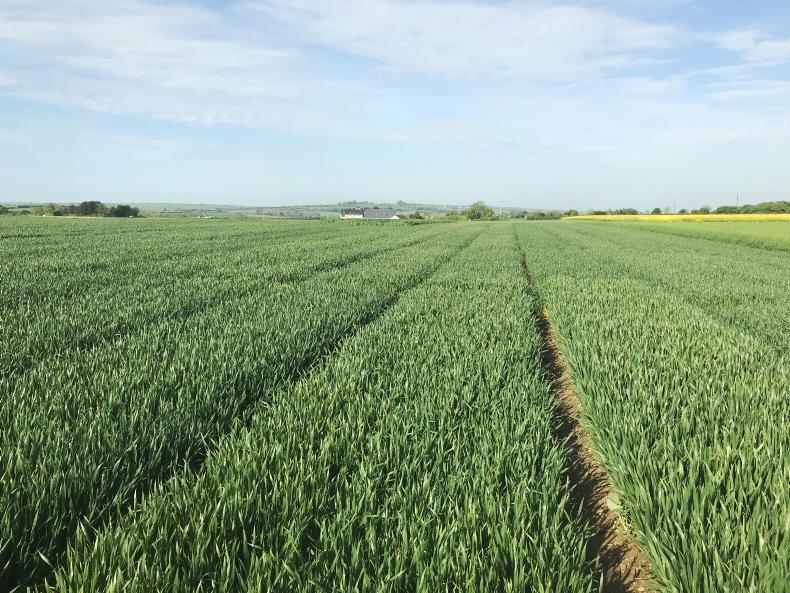

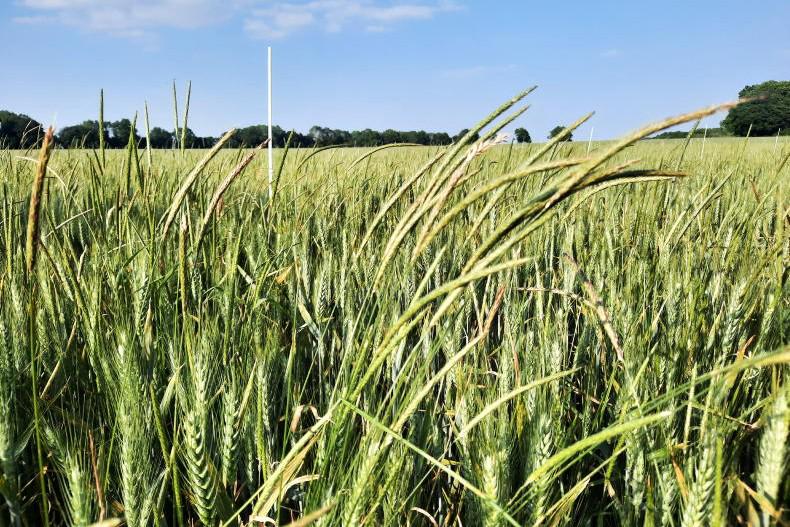
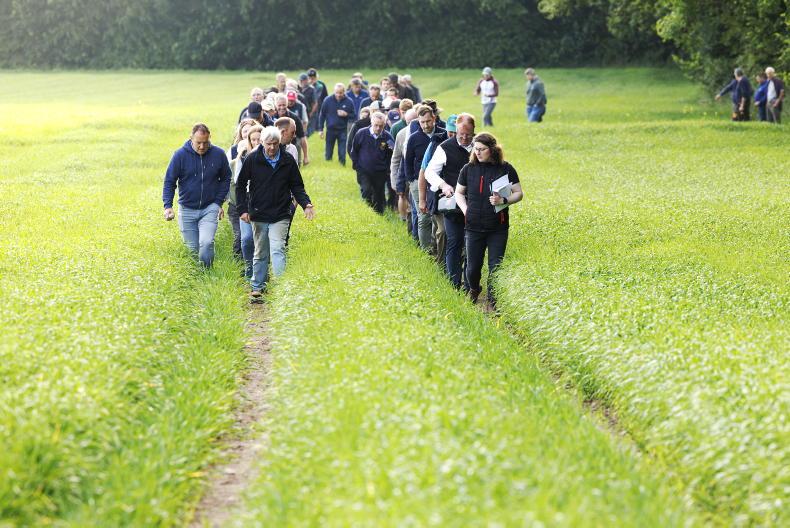

SHARING OPTIONS